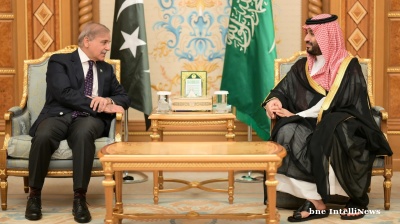Parliament speaker Vadim Krasnoselsky has won the December 11 presidential elections in the Moldovan separatist republic of Transnistria, according to the sole exit poll carried out by the Russian Public Opinion Research Centre.
The president of Transnistria is the head of the government as well. Krasnoselsky’s win thus gives full power to Obnovlenie, the political arm of Sheriff economic holding. Sheriff already dominates the region’s economy and Obnovlenie has had a majority in Transnistia’s legislative body, the Supreme Soviet, since the parliamentary elections last year.
Final results will be revealed on Monday, December 12, state news service novostipmr.com announced, but Krasnoselsky appears to have defeated his main rival, incumbent President Evgheni Shevchuk, by a massive margin.
The exit poll put Krasnoselsky on 69.8%, with Shevchuk trailing on just 18.8%. The turnout in the December 11 election was 56.2%, well above the 25% mandatory threshold. The voting-age population of the self-proclaimed republic is around 400,000.
The wide margin leaves little doubt about the winner of the elections, even though only 48.7% of the 11,278 people questioned by pollsters agreed to answer. The credibility of the polling agency was also questioned by novostipmr.com, the official news portal of the government controlled by Shevchuk.
On its Facebook page, the electoral commission CEC PMR quoted international observers confirming the smooth electoral process. "The elections were held in full accordance with law" Lithuanian observer Einars Graudiņš said. CEC PMR also quoted observers from Russia, Estonia and Finland on its webpage – all of them praising the organisation of the voting.
Policy uncertainty
It remains highly unclear what economic policies Obnovlenie will pursue once in power. While in opposition to the government and holding the parliamentary majority, it promoted totally unrealistic ideas with the sole purpose of impairing the government’s activity. These included maintaining an unsustainable exchange rate and endorsing unrealistic budgets.
The burden will now be on Krasnoselsky to tackle the deep economic problems in the region, which depends in all respects on Russia.
Support from Russia, in the form of economic cooperation, is expected to help Obnovlenie improve the situation in the medium term, but much more is needed to bring the standard of living on a par at least with Moldova.
In a window-dressing attempt during the last couple of months, Shevchuk released a series of optimistic economic statements announcing wage and pension hikes. The economy is in much better shape compared to five years earlier when he won the election and the outlook is even better, Shevchuk claimed.
However the financing of his recovery programme, aimed at stimulating small entrepreneurs, depended on the “$250mn bill”, a bill under which Shevchuk and his government wanted to practically confiscate $250mn, 25% of the region’s GDP, from Sheriff. This would be only one quarter of the tax allowances given by the state to Sheriff in the past, Shevchuk argued. The parliament has so far succeeded in blocking the claim, while still giving the impression that it agrees with the idea.
This strategy, however, was successful only with Shevchuk in the president’s seat. The bill in its current form is likely to be dropped, but Transnistria’s Russian backers may still insist on the money being claimed from Sheriff.
In another of the key issues facing the unrecognised republic, the end of the battle between Shevchuk and the parliament led by Krasnoselsky might smooth the negotiations for the normalisation of its statute as part of Moldova.
The process had been stalled by political uncertainty on both sides of the Dniester river dividing Moldova proper from Transnistria, which has been de facto independent since the brief war between Chisinau and the separatists in 1992.
The normalisation is likely to be helped by the victory of pro-Russian candidate Igor Dodon in the presidential elections in Moldova, while Krasnoselsky is also likely to favour Russia’s interests in the region. Shevchuk had argued in favour of the republic’s unification with Russia, a plan not explicitly endorsed by the Moscow authorities that would rather opt for the federalisation of Moldova with Transnistria as a part of it.
Dodon and Krasnoselsky can be expected to smooth the settlement of the Transnistrian issue in line with Russia’s preference, in exchange for the continuation of financial aid for Transnistria and a lifting of the trade restrictions against Moldova. However, all the interested parties seem to plan and make decisions in real time rather than following a pre-defined plan, making the progress towards a solution to the long-standing conflict hard to predict.
News

Trump mistakes Armenia for Albania for the third time at UK press conference
US president says he brought peace to “Aberbaijan” and Albania as he touts his peacemaker credentials during UK state visit.

Iran conducts evening ballistic missile test at Semnan facility
Iran conducts evening ballistic missile test at Semnan range with Sejjil-class system, residents report dramatic launch amid heightened security around military facility.

Pakistan gives Saudi Arabia a landmark Article 5 collective security guarantee
In what is likely to be a game-changing decision, Pakistan, a nuclear power, has given Saudi Arabia an Article 5-like collective security guarantee.
_1758207765.jpg)
Latin America's development gains under threat as one in four live in poverty, UN report finds
UNDP warns of stagnation and rising vulnerability across the region amid "overlapping crises".




